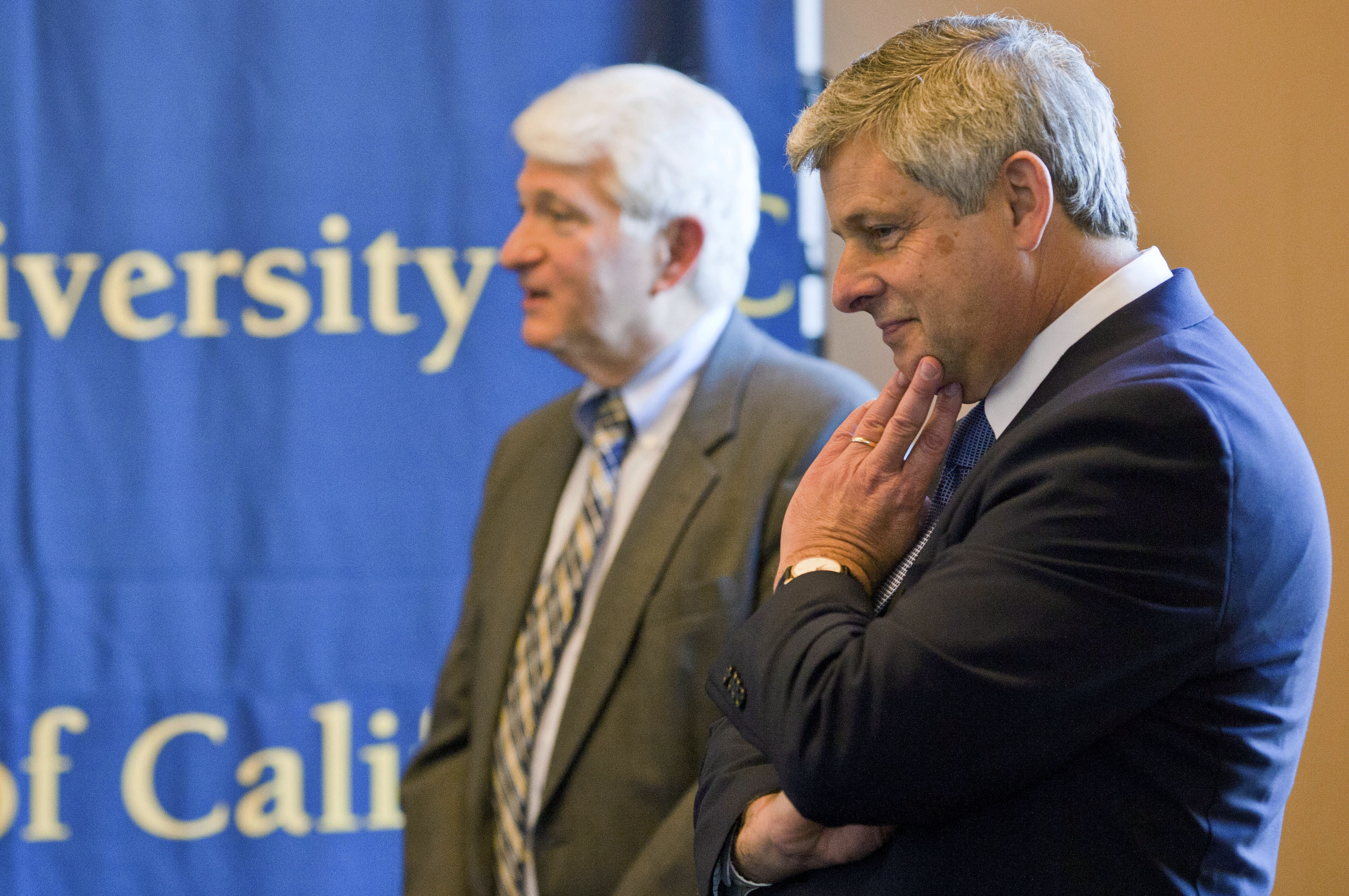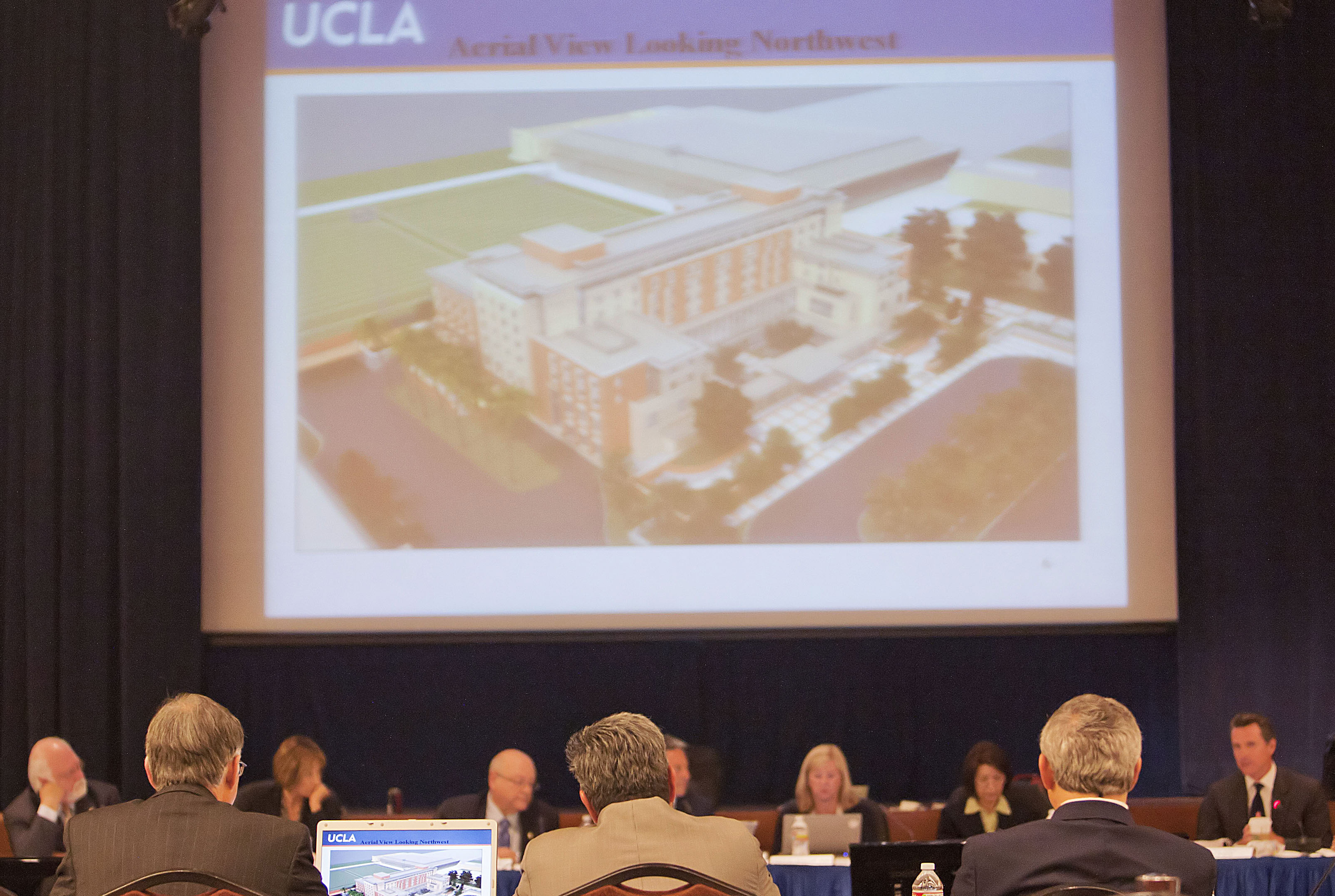
A proposed UCLA hotel and conference center received the green light from the University of California Board of Regents last week ““ a turnaround from the concerns the board expressed over the controversial project at its March meeting.
At the regents’ bimonthly board meeting on Wednesday, the board voted unanimously to approve the $152 million Meyer and Renee Luskin Conference and Guest Center. Upon completion, the center will house 25,000 square feet of meeting space, 250 guest rooms and a new parking garage on Westwood Plaza and Strathmore Drive, replacing Parking Structure 6.
The center will be funded by a $40 million donation from alumni Meyer and Renee Luskin ““ who also gave funds to the UCLA Luskin School of Public Affairs ““ and $112 million in bonds, said Steve Olsen, UCLA vice chancellor for finance, budget and capital programs.
An additional $10.4 million in campus funds and housing reserves will be used to build a new kitchen within the guest center and to upgrade Ackerman turnaround.
No money from tuition will be used to finance the project, Olsen said.
The project has been in debate for about a year and a half since the Luskins donated $40 million for the center’s construction in January 2011. It was first proposed to replace the UCLA Faculty Center. But that plan was later scrapped after faculty and neighbors protested the location, and the Academic Senate released a report advising that the size of the proposed center be scaled down.
The board was expected to vote on the budget and financing for the conference center in late March, but did not make a decision, citing concerns over the expenses involved with the project.
“We needed time to ask a series of questions,” said Regent Hadi Makarechian during the July meeting. “Today we have a much more clear understanding of this item.”
Members of the board’s Committee on Grounds and Buildings reacted positively to presentations about the center during Tuesday’s meeting, thanking UCLA officials for answering questions that surfaced in March when the project was introduced to the regents. The board concluded that the center was a necessity for the university, Makarechian said.
In the spring, some regents questioned why UCLA would undertake the financial burden of building a new center instead of purchasing and renovating a local hotel.
UCLA Chancellor Gene Block explained during Tuesday’s meeting that this was impossible because the Luskins asked that their donation be used specifically for an on-campus facility.
Block added that the center’s guest rooms will make academic conferences more convenient, as guests will no longer have to shuttle back and forth from a campus conference location like they do now. Instead, they will be able to continue discussions and get to know each other better since they will be staying together at the guest center, he said.
“I think it’s really important that this hotel be located on campus, because convenience is a natural draw,” said Regent Fred Ruiz during the meeting. “(The center) will add great value to the UCLA campus.”
Opponents were concerned that the center might take away revenue from nearby hotels.
The center will be exempt from certain taxes because it is not a truly commercial business, enabling it to offer rooms for an estimated $185 per night, compared to the over $200 charged by some hotels in the surrounding area.
During the meeting’s public comment period, attorney David Greenberg of the Save Westwood Village neighborhood organization asked regents to consider building a stand-alone conference center without guest rooms.
However, rooms will only be rented to those visiting for UCLA-related events such as academic conferences, admitted student days and hospital treatments, Olsen said. Rooms will not be open to the general public.
Some regents at the July meeting expressed worries that the guest center would not bring in enough revenue to generate a profit.
Hotel closures in the area have created a high demand for rooms, said Jack Powazek, UCLA administrative vice chancellor. He added that UCLA officials conducted focus groups with the campus’ academic departments and concluded that if the departments host all the conferences they wish to, the hotel’s rooms will be filled often enough to make a substantial profit.
The center is expected to create enough revenue to cover operating costs in 2016-2017, its first year of operation. The $112 million in funding that is not from the Luskin’s donation will be repaid from the center’s revenues after several years, according to university documents. After that, revenues will go toward operations and upkeep, making the center a self-sustaining enterprise, said Steve Ritea, a UCLA spokesman.
“It was the regents’ duty to take a careful look at this decision, and they did,” Olsen said. “We’re happy they made the right decision.”
Construction on the center will begin next summer, and the project is slated to be finished in the summer of 2016, Olsen said.
The board will vote on designs and environmental studies for the center at its September meeting.
